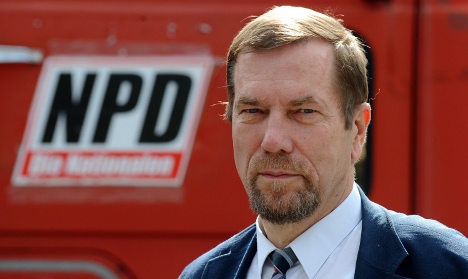The 63-year-old Hamburg lawyer and NPD deputy chairman had been in a coma since Saturday night, when he suffered a stroke at a meeting of the party’s leadership in Berlin.
He was rushed to hospital, where his condition steadily worsened.
Rieger’s son Harald said the family was considering a cremation or a burial at sea because they did not want his grave to become a neo-Nazi pilgrimage site.
The Office for the Protection of the Constitution (BfV), a government agency that monitors extremists, said Rieger’s death was a serious blow for the far-right movement.
Rieger was a key fund-raiser for the cash-strapped NPD, which was slapped with a €1.27 million fine in May for accounting irregularities.
The BfV’s Lower Saxony president, Günter Heiß, said on Friday that Rieger’s death would leave a hole in the far right scene that could not be quickly filled.
“I don’t see any such prominent personality,” he said. “Rieger was a one-of-a-kind phenomenon in right-wing extremism, because he was hyperactive in many areas. He was on the go, around the clock, on right-wing extremist issues.
“He was unbelievably hard-working.”
Rieger was particularly energetic in attempting to acquire property for far-right activities. He made news in August when he tried to buy an old hotel to convert into a neo-Nazi training centre in Lower Saxony, sparking a tense standoff between right-wing extremists and police.
Rieger was thought to have contributed several hundred thousand euros to far-right causes. But Heiß said it was not clear whether any of his assets, estimated at about €500,000, would be bequeathed to the NPD.




 Please whitelist us to continue reading.
Please whitelist us to continue reading.